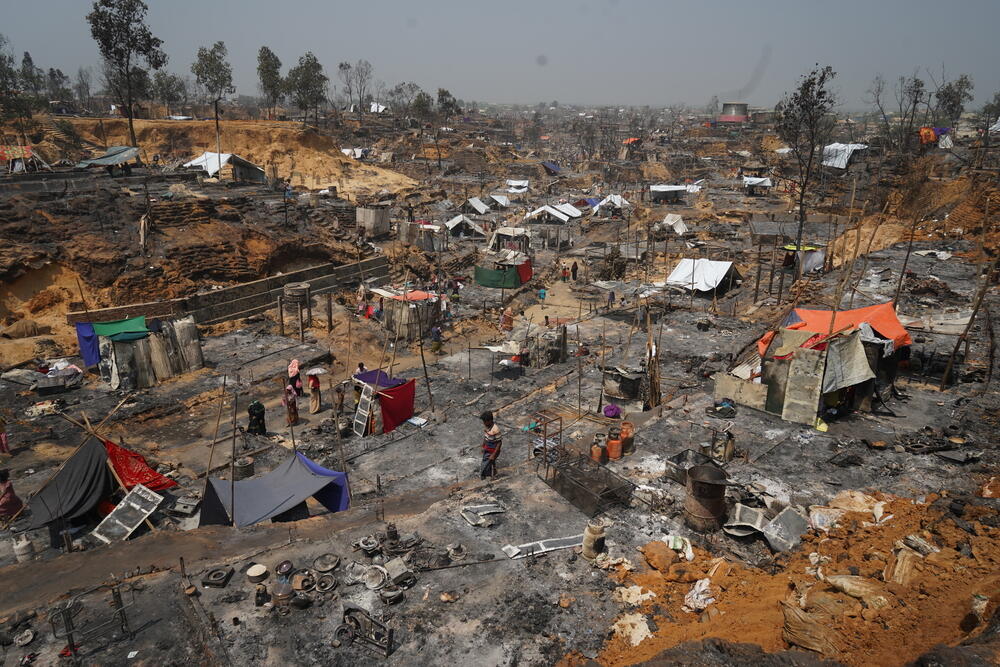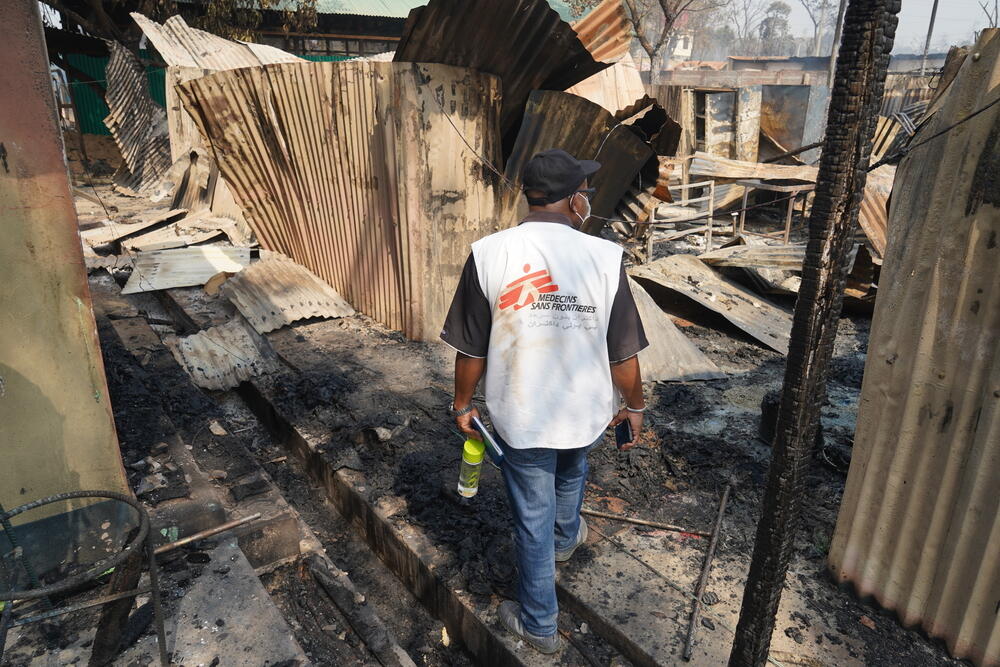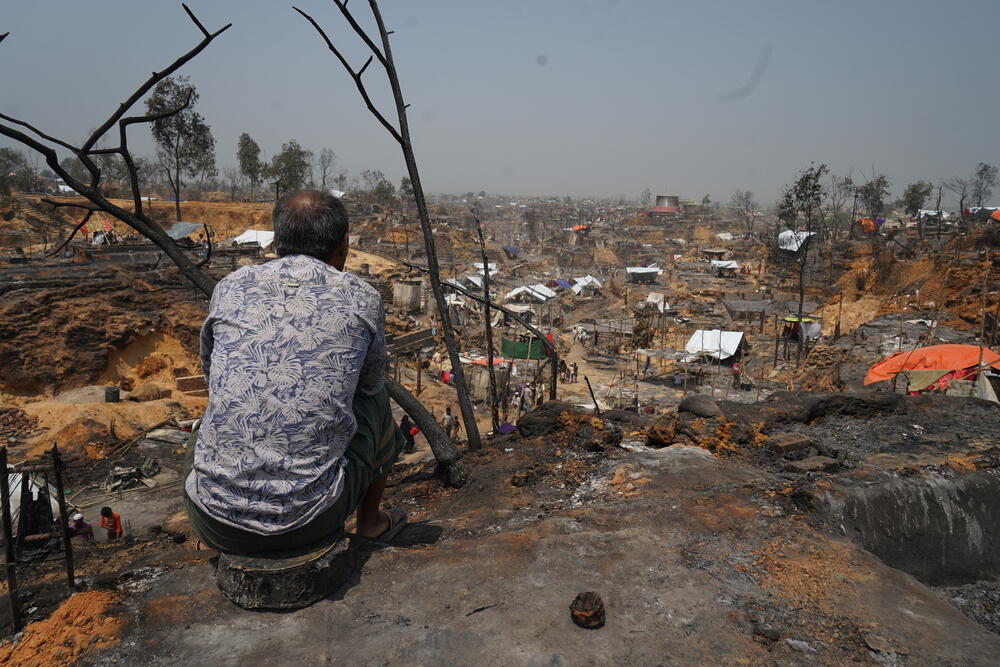Bangladesh camp blaze: "We weren’t able to climb the fence and the fire was approaching"
On 22 March, a devastating fire ripped through the world’s largest refugee camps in Cox’s Bazar, Bangladesh, destroying thousands of shelters and several health facilities - including an MSF clinic.
This was not the first fire in the camp in the last six months, devastating the lives of many Rohingya refugees living there. The latest incident adds to the already terrible situation with reduced access to healthcare, increased violence and poor living conditions faced by one of the world’s most persecuted ethnic minorities.
“We were a group of around 10 women, many with children. Everyone screaming and crying," explains Fatima, one of the refugees that had to run away from the blaze that engulfed thousands of shelters in Cox’s Bazar earlier this week.
"We were not able to climb the fence and the fire was approaching. We tried to use a hole under a toilet next to the fence, but only small children could go through.”
“I had the idea to put my sandals in my hands so I could force the wires apart and we could finally escape.”
As the fire approached, many found themselves trapped between the flames and the fence surrounding most of the camps.
“Men could climb, some tried to help their female relatives, but it was very difficult for most of us, and in addition, our clothes were snagging in the barbed wire,” she explains.
After crossing, some had lost part of their clothes: they felt terribly ashamed as some men were looking at them.

Help us prepare for the next emergency
Fatima is one of the Rohingya volunteers in the Balukhali clinic, that was destroyed by the fire. “I was in the clinic, around 2:30 in the afternoon when we first realised there was fire, but it was still far.
“As it was coming closer, I got scared and we finally left the clinic after we heard an explosion. I could hear many children crying and calling their mothers”.
"The living conditions in the camps have been steadily worsening for more than a year, and this fire and the loss of thousands of shelters shows just how vulnerable the situation is for refugees"
“I went to look for some relatives living in Camp 9 [one of the most affected by the fire] and I saw their house burning. Fire was really close and I jumped into a pool of drain water to escape”.
10,000 shelters lost
Fatima’s sister-in-law, Begum, was home with her sister and her seven-year-old grandson when the fire started.
“At first it was far, we were not too afraid, but as it got closer we got very scared and each one of us ran in different directions”.
She managed to cross the fence sneaking under the barbed wire but got slight wounds on her ankle. Begum finally met her relatives five hours later in the bazaar. Their shelter had totally disappeared.
In recent weeks there have been at least two other minor fires in the camps but this week’s fire spread through a major extension in different camps.
According to UN estimates, 11 people died and flames burnt around 10,000 shelters (hosting 45,000 people).
Many health facilities were also destroyed, including MSF’s Balukhali clinic, serving over 30,000 people and offering a wide range of services.
MSF teams assisted a dozen patients with burns or injuries, some caused by the fences. The Balukhali team will resume some healthcare services later this week.
Building temporary accommodation
“Now we have just received a few bamboo poles, some plastic sheeting and buckets. We hope we will get something else so we can rebuild our shelter,” Begum says showing in her eyes she is still shocked by the experience.
“This fire brought back the anguish we felt when we had to run away from our hometown. Fire was chasing us there and it was the same here.”
Some of her neighbours are also slowly returning to where their shelters. They cannot leave them empty for too long or strangers may occupy them.
Many refugees are staying with relatives in other parts of the camp. UN agencies and camp authorities haves started distributing shelter kits (some bamboo, tarpaulin and plastic sheets) so those who lost their shelters can construct new temporary ones.
Some have been allocated tents or have started properly rebuilding the makeshift houses, but others cannot afford the 1,000 taka (around £8.50) that a pack of bamboo poles costs.
“The living conditions in the camps have been steadily worsening for more than a year, and this fire and the loss of thousands of shelters shows just how vulnerable the situation is for refugees,” says Natalia Torrent, MSF’s country representative in Bangladesh.
“These makeshift shelters are a temporary solution, but they do not allow a life in dignity or safety. It is important that Bangladesh authorities and UN agencies responsible for management of the camps provide more adequate and humane living conditions to the refugees,” she adds.
Another refugee, Syed, also saw his family’s shelter totally destroyed. Eight of his relatives, including Syed, were living in the shelter and are now scattered across the camp.
“We were lucky because near our home the fence was being repaired and that specific day there was no barbed wire so we could easily exit the camp”, he says. “Now it is closed again.”
“This fire brought back the anguish we felt when we had to run away from our hometown. Fire was chasing us there and it was the same here”.
MSF and the Rohingya refugee crisis
On 25 August 2017, a massive exodus of 745,000 Rohingya refugees began to flee Myanmar. Now, more than three years on, nearly one million people remain stranded in vast refugee camps.
In that first month, a concerted campaign of violence was unleashed by the Myanmar authorities against Rohingya people in the country’s Rakhine State. By the end of the year, more than 660,000 people had crossed the border into Bangladesh.
MSF massively increased its capacity to respond in the area following the massive influx of Rohingya into the country and launched large emergency responses in the Cox's Bazar area.
In the first six months of the crisis alone, we treated more than 350,000 patients.
The main health issues we are seeing re respiratory infections, diarrhoeal diseases, skin diseases – all related to poor living conditions.


